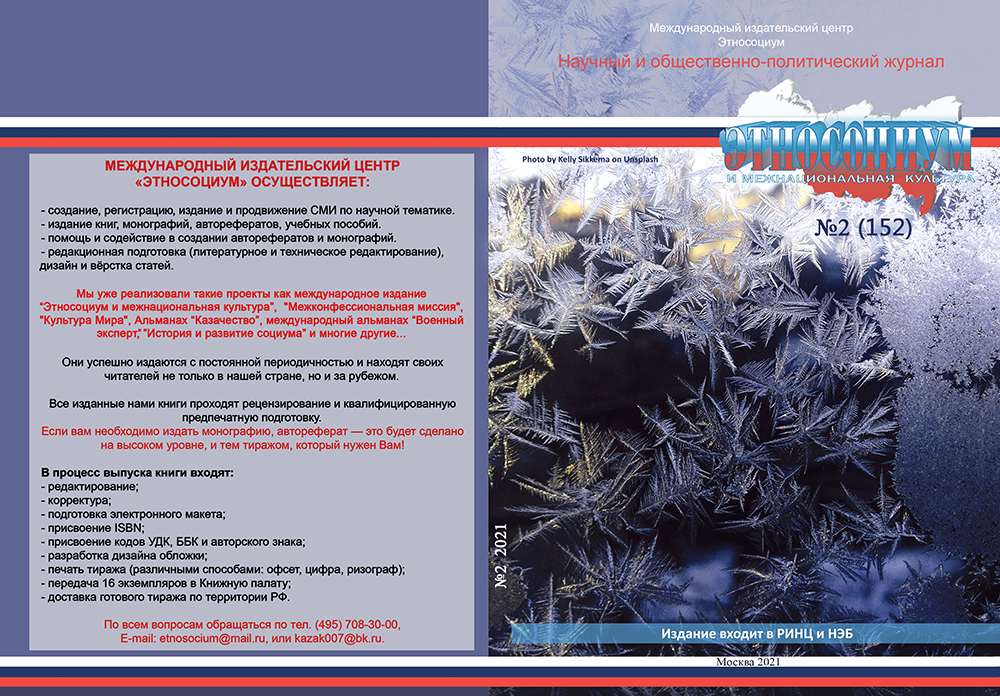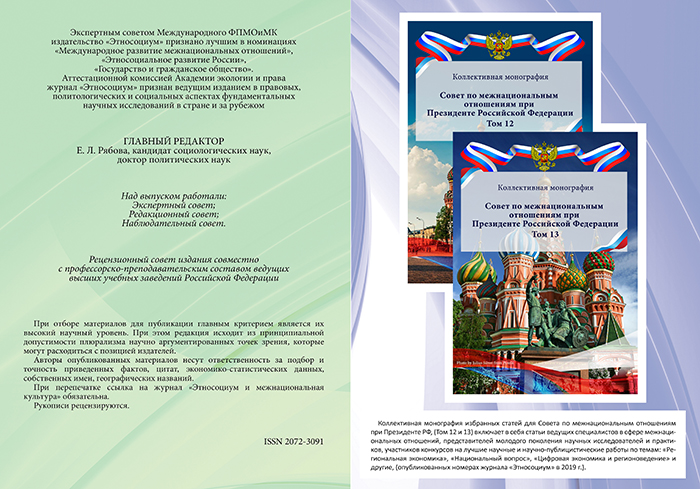

Content
|
COUNCIL OF INTERNATIONAL RELATIONSHIP
|
|
|
Rodionov M.A., Volkova T.A. Political leaders of states during the second world war (importance for modernity)
|
9
|
|
Lebed' E.S., Rybakov S.V. About some features of cross-cultural interaction
|
32
|
|
ACTUAL PROBLEMS OF MODERN SOCIETY
|
|
|
Lezina O.V., Ternovaya L.O. Integral paradigm of education and its perspectives in the post-COVID world
|
42
|
|
Moshkov A.V. Spatial features of the formation of the Far Eastern tourist and recreational zone of Russia
|
50
|
|
INFORMATION TECHNOLOGY
|
|
|
Chapkin N.S. Modern realities and trends in the development of information and communication technologies in education
|
67
|
|
REGIONAL STUDY
|
|
|
Poluyanova O.G. Neo-nomenclature forms of interaction regional power groups with higher education institutions in the creative field of urbanism
|
79
|
|
Skliarova S.A. Impact of the state policy of socio-economic development on digital transformation in the agro-industrial complex
|
87
|
|
Zadorin M.Y., Tamitskiy A.M. Political, legal and institutional framework of counteracting interethnic intolerance among the young people in contemporary Russia
|
97
|
|
Khibarin V.A. On the imperative of people saving as an actual national idea of Russia
|
107
|
|
INTERNATIONAL RELATIONSHIPS
|
|
|
Alymkulova Aigul China's soft power diplomacy in Central Asia
|
122
|
|
Wang Yue Maternal share in V. Rasputin's story "Ivan's Daughter, Ivan's Mother"
|
136
|
|
REVIEW
|
|
|
Cheremnyh L.G., Turova E.I. Methodology, science, ethics
|
143
|
|
Abstracts
|
147
|
|
Authors
|
160
|
|
Requirements to materials submitted to the international publishing house "Etnosocium"
|
163
|
The article examines the significance of the experience of the activities of political leaders of the leading states in the preparation and conduct of the Second World War for the present. Military, political, economic, informational, institutional aspects, problems of national identity, coherence of political elites and other issues are considered.
Keywords: military and political elites, geopolitical rivalry, war, information warfare, state and military management, information and analytical support, national identity, coherence of political elites, color revolutions.
The article analyzes the characteristic features of cross-cultural interaction. The meanings concerning its conceptual basis, structure, practical models and configurations, levels, types are revealed. Mental and psychological barriers and hindrances that hinder the development of cross-cultural communications are shown. The key principles of implementing cross-cultural strategies are considered through the prism of typology of cultures.
Keywords: communication, cross-cultural communication, culture, typology of cultures.
Education is the social institution without which the development of society is unthinkable. At the same time, it also evokes now and has evoked in the past a huge number of critical assessments. Their number increased many times over when, in the context of the coronavirus pandemic, there was not only a forced, but also a sharp transition to distance learning. Despite criticism, education has shown its ability to resist this challenge, as well as to develop such forms and methods of teaching and educational work that fit well into the requirements of the new integral paradigm of education that meets the needs of the future society. The article presents evidence that distance learning meets the requirements of an integral approach and should be organically combined with classroom forms of activity.
Keywords: integral education, higher school, upbringing, multimedia, distance learning, case-study.
Spatial combinations of territorial tourist and recreational systems of different ranks can form special tourist and recreational zones with common factors and conditions for conducting tourist and recreational activities, similar economic specialization, and prospects for their socio-economic development. The Far Eastern Tourist and Recreational Zone (DVTRZ) includes the subjects of the Far Eastern Federal District (Far Eastern Federal District): the Republic of Buryatia, the Republic of Sakha (Yakutia), the Trans-Baikal, Kamchatka, Primorsky and Khabarovsk Territories, the Amur, Sakhalin, and Magadan Regions, Chukotka Autonomous District, and the Jewish Autonomous Region. According to the combination of physical, geographical and socio-economic factors, two meridional tourist and recreational sub-zones are distinguished within the DVTRZ: "coastal" and "continental". The "coastal" tourist and recreational sub-zone includes the subjects of the Far Eastern Federal District, the administrative borders of which are directly washed by the seas of the Pacific Ocean (Kamchatka, Primorsky and Khabarovsk Territories, Sakhalin and Magadan Regions, Chukotka Autonomous District).The coastal and marine geographical position of the subjects determines the presence in this sub-zone of a special combination of favorable factors for the development of tourist and recreational activities.
Keywords: territorial tourist and recreational systems, the Far Eastern tourist and recreational zone, coastal and continental sub-zones, SWOT analysis, rating of subjects.
The article analyzes the documents of the World Summit on Informatization, the study of the Eurydice educational network to determine the degree of use of ICT in teaching and learning in European schools, the Recommendations of the European Parliament and the Council on Key Competencies for Lifelong Learning and other publications and documents. The experience of the leading countries of the world in the implementation of information technologies in the educational process is considered: the adoption of ICT competence as a means of obtaining other competencies, the introduction and financing of state programs for the informatization of education, the spread of cloud technologies, electronic and distance learning, the compilation of repositories of electronic resources, as well as the development of an assessment model the state of informatization of educational institutions. The main trends in the development of information technologies in education are highlighted.
Keywords: information and communication technologies, education system, model for assessing the state of informatization of educational institutions.
The relationship between government and higher education in socio-cultural, political and economic aspects has always been one of the necessary directions in the work of government structures. In Soviet times, the interaction of government structures (better known as the nomenklature) and higher educational institutions took place mainly in ideological and political terms. At present, these relationships are most clearly manifested in the activities of building political and socio-cultural relations. The most important socio-cultural trend in the last two decades has been the help of regional elites in building a model of a creative city and creating a creative environment both in Perm and in the Perm Region. The article proposes to describe the relationship between the Soviet political elite (nomenclature) and higher education institutions in ideological and political terms, and the modern Perm regional elite with universities in socio-cultural terms (as one of the neo-nomenclature practices) within the framework of the concept of a creative city and the creation of a creative environment in Perm.
Keywords: creative city, creative environment, creative (creative) industries, creative urbanism, innovative economy (knowledge economy), geocultural branding of the region, regional elites, nomenclature, neo-nomenclature practices.
The article analyzes the strategy of modern socio-economic policy of the Russian Federation at the federal and regional level, aimed at implementing digital transformation technologies in order to ensure the digitalization of the domestic agro-industrial complex, which is considered as a key prerequisite for ensuring its competitiveness and intensification of development. Based on the characteristics of the practical results of the implementation of this strategy, its effectiveness in the context of achieving the above goal is evaluated.
Keywords: agro-industrial complex, agricultural production, strategy of socio-economic policy, technology of digital transformation, digitalization.
The article attempts to present the political, legal and social practices associated with countermeasures against the spread of interethnic intolerance among the youth. The authors demonstrate the importance of international and internal statutory regulation of fighting intolerance, the infrastructure of institutional support for the prevention of xenophobia, including state and public organizations and associations.
Keywords: interethnic relations, racism, xenophobia, intolerance, youth, politics.
In recent years, liberal democracy as an ideology and a form of political self-organization, as if suitable for all nations and countries without exception, has come into a state of deep crisis. In this regard, the problem of state ideology is becoming relevant for our country, which defines the main directions and ways of development of Russian society. Purpose of work: justification of the concept of people saving as a fundamental imperative in the development of the ideology of the Russian Federation. The research methodology is an analysis of the concept of «national idea» as a scientific category, its place and role in the history and culture of Russia. As a result, the author concludes that the imperative of the Russian people (peoples) saving can, in a broad sense, serve as the basis of the central idea guiding the current domestic and foreign state policy of the Russian Federation.
Keywords: ideology, people saving, national idea, updated constitution, Russian.
In the frames of «One Belt One Road» initiative China and Central Asian countries are building tight economic relationships and managing different projects, that has long term strategic perspectives. China use soft power in order to build a positive image for perspective partners in different countries. But anti-China movements, the threats of terrorism, extremism and separatism, and the lack of large scale policies aimed to popularise Chinese culture caused the risk for Chinese soft power, especially in the region of Central Asia. Current paper is written based on Russian and Central Asian scientists works and datas. This paper is aimed on research of the soft power of China and problems China faces working with Central Asian countries.
Keywords: China, Central Asia, soft power, foreign policy.
Rasputin is a master writer of Russian literature in the second half of the 20th century. He criticized the current situation and paid attention to the suffering of the people at the bottom of Russia. He was called the leader of Russian "country novel ", and his masterpiece" Ivan's daughter, Ivan's mother "in his later years was a masterpiece of Russian critical realism literature after the collapse of the Soviet Union. Its novel vividly depicts the bottom people Tamara family because of minor daughter violence, court malfeasance, no door to help and then Tamara blade murderer, and the whole process of prison and release from prison. This paper mainly interprets the maternal feelings in the subconscious mind of this great nation in Russia, which is manifested by the actions of Tamara, a mother, after her daughter was killed.
Keywords: Ivan's daughter, Ivan's mother, Rasputin, mother, protection.
The monograph is being reviewed, in which all norms governing scientific activity are divided into methodological and ethical ones. The norms related to fundamental and applied science are shown, assumptions are made about the possibility of a single ethos of science. The main types of mass violations of the scientific ethos are highlighted and described, their causes are revealed, ways of their prevention are outlined.
Keywords: ethos of science, fundamental science, applied science, ethical regulation of science, academic fraud.